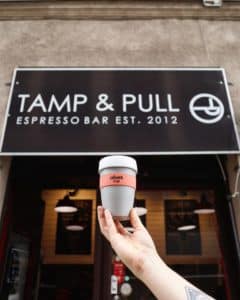Hungarian startup to help to protect our environment with plastic clever cups
The EU would like to ban all plastic utensils used in fast-food restaurants until 2021 like plastic knives, forks and spoons or even plastic cups. Therefore, a Hungarian startup business, the Clevercup, made smart plastic cups for the cafés.
All cups are covered by a silicon layer on which there is a permanent QR code, and behind the code, there is an outstanding customer management software. The café subscribes and orders the cups giving them to the customers who can register online, upload money and during the next visit they can buy their drinks with the help of their cups – Forbes.hu reported.
Such way the cafés can easily follow the habits of their regular customers, and in case they can even mobilise them while
the whole system is GDPR compliant.

The Clevercup LTD is the joint enterprise of the Netlient LTD dealing with customer management issues and the Kaffeine speciality café chain. Krisztina Bakos, the marketing director of the company, said that they started to talk about the issue only one year ago before the EU decided to ban all plastic utensils from the restaurants until 2021.
For example, the Kaffeine chain already cast away plastic sippers from their shops before, but the problem of disposable cups is much more significant.
“We talk about hundreds of thousand plastic cups just in our cafés” –
Dávid Nagy, director of Kaffeine LTD, said.
The problem is that even though such cups are called paper cups, they are not made only of paper, but there is plastic in them, as well, so they cannot be collected and recycled selectively. This is why they want to give each customer their own cup.
Smart cups are simple, coloured plastic tools and
they cost only 500 HUF (approximately 1.5 EUR) for the cafés.
Of course, it depends on the decision of the cafés for how much they sell them to their customers. The goal of the whole system is to make customers use their cups more than one time, and if they decide to replace their favourite clever cup, they can throw them into the plastic waste bin. Dávid Nagy added that they worked a lot to reduce the price of the clever cup which is crucial taking into consideration that nobody would buy a coffee for 600 HUF (2 EUR) and a cup for 4-5,000 HUF (EUR 13-17). For example, they sell the cups in the Kaffeine cafés for 5,000 HUF (EUR 17) but if somebody buys one they receive 5,500 HUF on their clever cup account.
All customers can use their smartphones as virtual cups so they can buy coffee with their phones, too- András Szilágyi, the founder of Netlient, said. The solution is not entirely new, the Costa café chain, for example, sold vacuum-flasks which could not become very popular in Hungary.
Clevercup.co, the website of the company, is multilingual because the founders would like to expand their business abroad. According to them,
they already received offers from even the USA.
Not enough? HERE you can read about two Hungarian startups at the forefront of European healthcare innovation while HERE you can find an article about a Hungarian innovation that aims to revolutionise camping.







